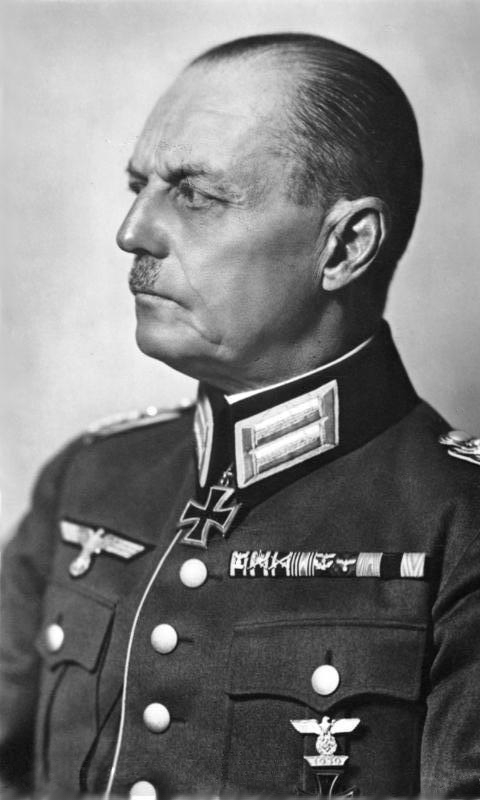Gerd von Rundstedt
Gerd von Rundstedt was an important figure in the German army during World War Two. Rundstedt was 63 at the outbreak of war, but he played important roles in the invasions of Poland, Western Europe and the USSR
Born on 12 December 1875 to a military family, Rundstedt joined the German Army at the age of 17. At the outbreak of World War One, Rundstedt held the rank of captain. In November 1914 he was promoted to the rank of major.
The Treaty of Versailles severely weakened Germany’s military, but Rundstedt stayed in the army after the war. In 1932 he was promoted to the rank of lieutenant general and given command of the 3rd Infantry Division. At this point Germany was in a state of turmoil: her economy had been decimated by the Great Depression and the Nazi Party was rapidly increasing in popularity. Despite Rundstedt desire to avoid the world of politics, he became embroiled in the political crisis of 1932. Chancellor Franz von Papen dismissed the Prussian Government and imposed Martial Law in 1932: against his wishes, Rundstedt was appointed martial law plenipotentiary.

In October 1932, Rundstedt was promoted to the rank of full General and was tasked with leading the Gruppenkommando.
Rundstedt had been horrified by his experience in World War One. Infantry soldiers had been slaughtered at a hitherto unknown scale, and Rundstedt was determined to ensure that this mass slaughter was not repeated. He took a keen interest in modern infantry tactics and equipment which might reduce casualty rates in future wars.
Rundstedt supported German rearmament but opposed Germany's invasion of Czechoslovakia: he thought that Britain and France would intervene and defeat Germany. He was aware of anti-Hitler plots and did not report them. However, he did not take a strong stance against Hitler, and his Division played a role in the occupation of the Sudetenland.
In November 1938 he retired from the army. At the point of his retirement he was second-in-command of the German army with the rank of Colonel-General. Less than a year later, on 1 June 1939, Hitler recalled Rundstedt to active service. He was given command of Army Group South for the campaign against Poland. This group captured Warsaw.
After his success in Poland, Rundstedt commanded Army Group A for the Spring attack in Western Europe. This successful attack sealed Hitler’s favour. Rundstedt was promoted to the rank of field marshal on 19 July 1940.
Rundstedt took part in ‘Operation Barbarossa’, Nazi Germany’s invasion of the USSR, as commander of Army Group South. His primary targets were Caucasian oil fields. However he resigned his commission on 3 December 1941. Rundstedt wanted a tactical withdrawal to the Mius line so that his army could regroup before a fresh attack. But Hitler was stubbornly averse to tactical withdrawal, which he saw as a euphemistic synonym for retreat. Hitler’s obsessive meddling in army tactics and his refusal to sanction withdrawals angered several other senior offices during the Eastern Campaign. Rundstedt signalled his displeasure by tendering his resignation.
Rundstedt was recalled on 1 March 1942. He was appointed Commander-in-Chief West, a position he held for most of the rest of World War Two. In this position he dedicated much time and manpower to developing the Atlantic Wall in preparation for the expected Allied invasion. Rundstedt had little say in the technicalities of the wall design, which was left to the Todt Organisation. In the summer 1942, Rundstedt was not confident that the wall could fulfill its purpose of halting an Allied advance: he gave the Wall a life expectancy of around 24 hours once the Allies started their invasion.
After the successful Allied landings on D-Day, Rundstedt complained of Hitler’s constant interference in military matters. Rundstedt, supported by Rommel, wanted to withdraw his forces from the coastal area to regroup before countering the Allied advance. Hitler refused to agree to this. When it became clear that the German Army could not force the Allies back to the Channel, Rundstedt advised Hitler to seek a negotiated peace. Unsurprisingly Hitler did not listen and Rundstedt was replaced by Field Marshal von Kluge.
Rundstedt was captured by the Americans on 1 May 1945. While in captivity, Rundstedt suffered a heart attack and was sent to South Wales to recover. He remained in Britain until 1948. Russia and America wanted him tried as a war criminal for alleged crimes committed during the invasion of the USSR, but no trial took place. Rundstedt returned to Hanover and died on 24 February 1953.
MLA Citation/Reference
"Gerd von Rundstedt". HistoryLearning.com. 2026. Web.
